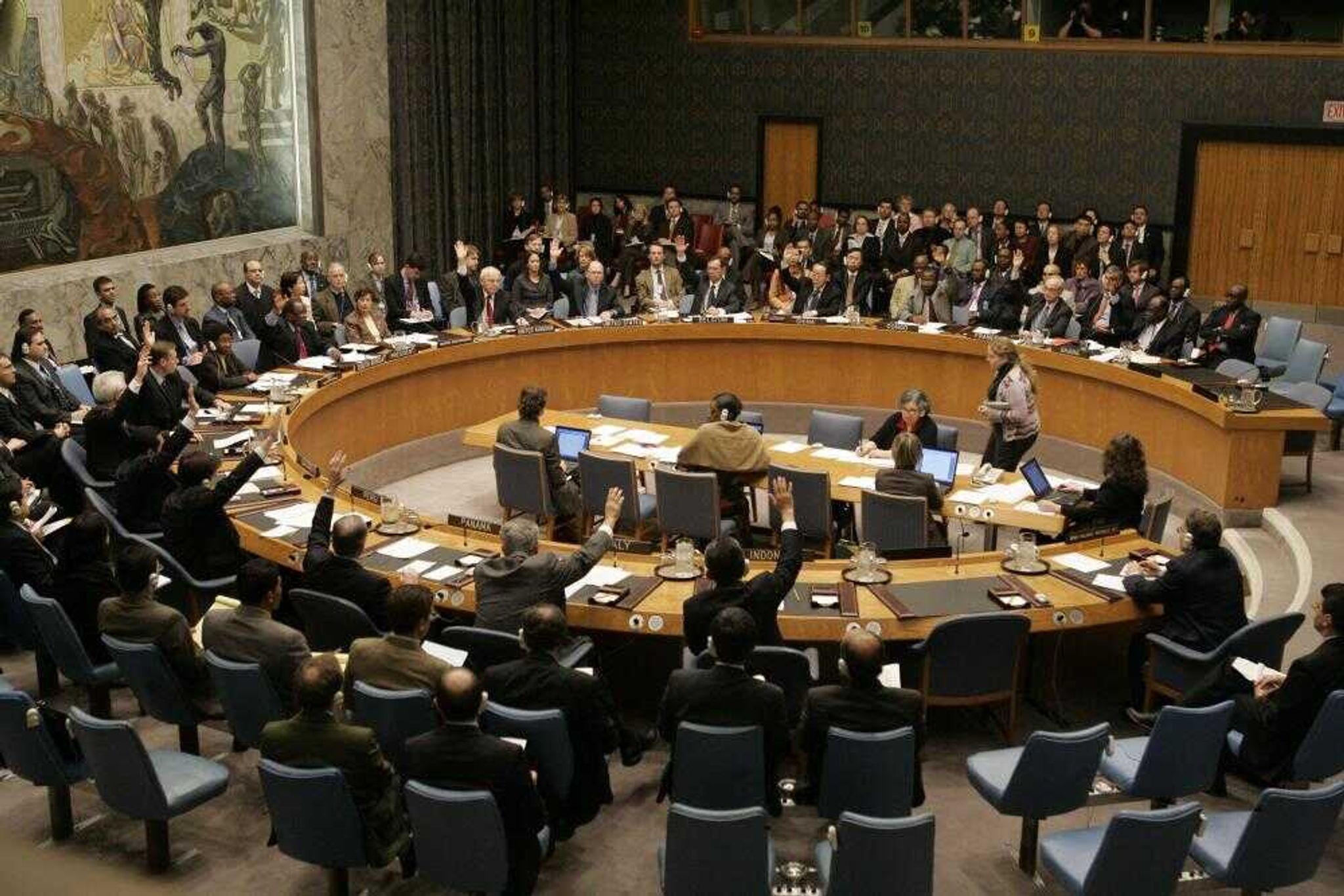U.N. Security Council unanimously approves new sanctions against Iran
UNITED NATIONS -- The U.N. Security Council unanimously voted Saturday to impose additional sanctions against Iran for its refusal to stop enriching uranium -- a move intended to show Tehran that defiance will leave it increasingly isolated. Iran immediately rejected the sanctions and said it had no intention of suspending its enrichment program, prompting the United States to warn of even tougher penalties...
~ The country has vowed the sanctions will only motivate it further to pursue nuclear power.
UNITED NATIONS -- The U.N. Security Council unanimously voted Saturday to impose additional sanctions against Iran for its refusal to stop enriching uranium -- a move intended to show Tehran that defiance will leave it increasingly isolated.
Iran immediately rejected the sanctions and said it had no intention of suspending its enrichment program, prompting the United States to warn of even tougher penalties.
"The world must know -- and it does -- that even the harshest political and economic sanctions or other threats are far too weak to coerce the Iranian nation to retreat from their legal and legitimate demands," Iranian Foreign Minister Manouchehr Mottaki told the Security Council after the vote. "Suspension is neither an option nor a solution."
The moderately tougher sanctions include banning Iranian arms exports, and freezing the assets of 28 people and organizations involved in Iran's nuclear and missile programs.

About a third of those are linked to the Revolutionary Guard, an elite military corps.
"It's a significant international rebuke to Iran and it's a significant tightening of international pressure on Iran," said Nicholas Burns, undersecretary for political affairs at the State Department. If Iran does not comply, "there's no question" that the United States will seek a third and tougher resolution, he added.
In December, the 15-member Security Council ordered all countries to stop supplying Iran with materials and technology that could contribute to its nuclear and missile programs. It also ordered a freeze on assets of 10 key Iranian companies and 12 individuals related to those programs. Iran responded by expanding enrichment, a process that can be used to produce nuclear energy or nuclear weapons.
The United States and some of its allies fear Iran's nuclear program is a cover for producing atomic weapons but Iran insists it is only for energy production.
Mottaki said Iran would return to negotiations over its nuclear program only if the United States and its European allies dropped the "unfair and unacceptable precondition" that it first suspend uranium enrichment.
Burns said that because of a "tumultuous political environment" in Iran "we believe there is a faction inside that government that wishes to accept this offer to negotiate."
He was apparently referring to criticism from some in Iran that President Mahmoud Ahmadinejad's confrontational rhetoric has deepened the country's isolation.
Ahmadinejad canceled a planned appearance before the Security Council and sent Mottaki instead, claiming the U.S. failed to deliver his visa in time. The U.S. said it had issued the visa promptly.
Raising tensions, Iran detained 15 British sailors and marines Friday in what it said were Iranian territorial waters near Iraq. The 15 had been on a mission to search for smugglers in Iraqi waters.
The six world powers that drafted the new resolution spent Friday trying to overcome objections from several council members, reflecting concerns that anything short of consensus would weaken efforts to rein in Iran's nuclear defiance.
There were several minor concessions but no changes to the key sanctions agreed upon last week by the United States, China, Russia, Britain, France and Germany.
The new sanctions -- already a compromise between the stronger measures favored by the United States and the Europeans and the softer approach advocated by Russian and China -- are considered modest. The ban on exports is among the harshest measures, but many of Iran's arms sales may not be affected because they are illicitly sent to militant groups like Lebanon's Hezbollah and Shiite militias in Iraq.
Still, world powers hoped that approving the resolution quickly and unanimously would signal that Iran will face stricter sanctions each time it ignores a Security Council deadline to suspend uranium enrichment.
"This resolution sends an unambiguous signal to the government and people of Iran ... that the path of nuclear proliferation by Iran is not one that the international community can accept," said British U.N. Ambassador Emyr Jones Parry.
In Paris, French Foreign Minister Philippe Douste-Blazy said the Security Council gave Iran a clear choice: "Cooperate with the international community or pursue their enrichment and reprocessing activities and worsen, in that way, their isolation."
Mottaki reiterated that Iran's goal was solely the peaceful pursuit of an alternative source of energy.
"We have expressed our readiness, taken unprecedented steps and offers several serious proposals to address and allay any possible concern in this regard," he said.
The new resolution asks countries to restrict travel by the individuals subject to sanctions as well as arms sales to Iran and new financial assistance or loans to the Iranian government.
It asks the International Atomic Energy Agency to report back in 60 days on whether Iran has suspended enrichment and warns Iran could face further measures if it does not. But it also says all sanctions will be suspended if Iran halts enrichment and makes clear that Tehran can still accept a package of economic incentives and political rewards offered last year if it complies with the council's demands.
After the latest resolution met with surprising resistance from several elected Security Council members, a reference was inserted to a past resolution from the IAEA calling for the Middle East to be free of weapons of mass destruction. Indonesia and Qatar had wanted the council to make that appeal outright, but that would have had implications for Israel, a U.S. ally widely believed to possess nuclear weapons, though it has never officially acknowledged it.
Israeli Defense Minister Amir Peretz -- whose country considers Iran its biggest threat -- said he hoped it the resolution would "really be put into effect and carry out the will of the free world, which will do everything to stop the process of Iranian nuclearization."
-----
Associated Press Writer John Heilprin contributed to this report from Washington.
Connect with the Southeast Missourian Newsroom:
For corrections to this story or other insights for the editor, click here. To submit a letter to the editor, click here. To learn about the Southeast Missourian’s AI Policy, click here.








